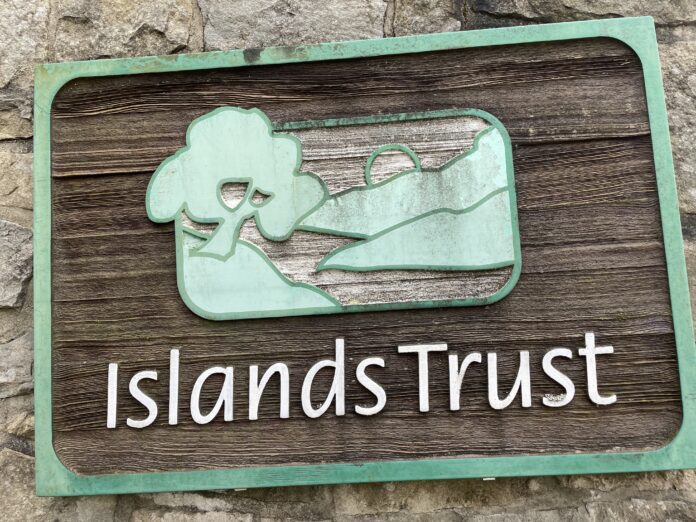Salt Spring officials have further reduced the island’s bylaw enforcement footprint, with local trustees setting the trigger for staff action on non-permitted dwellings at the literal dumping of septic waste on the land.
The latest move by the Salt Spring Island Local Trust Committee (LTC) directed staff to close bylaw enforcement files currently open for those properties “where there is no evidence of disposal of waste on land.”
Islands Trust compliance and enforcement manager Warren Dingman had presented a recommendation the land use authority step back from enforcement on those homes during the LTC’s regular meeting Thursday, June 6, alongside an overview of the current number of open enforcement files on all bylaw matters, which before the meeting numbered 236.
With the new resolution, that number will likely fall to under 200; Dingman estimated 40 of the 45 relevant enforcement files would be closed.
The resolution would not mean amnesty for those believed to have committed other offences to the land use bylaw, Dingman noted, such as having built without approval in an environmentally sensitive area; nor, he said, would it mean property owners were exempt from the regulations of other agencies, like Island Health or the Capital Regional District.
But for residences currently subject to enforcement from the Islands Trust strictly because of being non-permitted under the land use bylaw, those owners — and, possibly, their tenants — could be made immediately aware they were no longer being monitored by Trust bylaw staff.
“People are having to resort to illegal forms of housing, because that’s all there is on this island,” said trustee Laura Patrick, who said she believed the number of Salt Spring workers living in unpermitted or otherwise illegal rentals probably numbered in the “thousands.”
“And we know if we were to get rid of [that housing], the grocery stores would close, the hospital would be closed, schools would be closed,” said Patrick. “This isn’t a minor issue.”
Trustee Jamie Harris agreed — “At this point, you hate to enforce against anyone,” he said — but expressed concerns on septic discharge, joining Patrick in rejecting an early suggestion the LTC could simply close all enforcement files. Dingman said staff’s biggest concerns were not with properties where people had effected non-standard waste management systems, but rather those with no management of human waste at all.
“There’s a big difference between having an outhouse, or a compost system, or ‘here’s this system I engineered and built myself to dispose of my waste,’” said Dingman, “and when we see people who just run some pipes. They’re literally dumping their waste — grey and black — out onto the land on some part of their property.”
Dingman said bylaw staff had seen properties dumping septic waste into low-lying areas, or purpose-built open pits — or “just letting it flow downhill somewhere,” he said.
“The LTC has been clear that housing is the priority,” said Dingman. “The offence in the local land use bylaw is ‘the disposal of waste on land.’ So if there’s no disposal of waste on land — If someone’s getting it pumped out, they have receipts — that’s adequate.”
Trustees were unanimous in the motion to close all but those “most egregious” files; LTC chair Tim Peterson suggested staff bring additional reporting back to the committee on specifics for the remaining properties, to see if enforcement “needed to go further, or be more permissive” at that point.
With the closure of non-permitted dwelling files, the largest remaining number of open files in a single category relate to short-term vacation rentals (STVRs) — 77, according to the report — followed by 37 surrounding a lack of development permits for work underway in designated development permit areas. While fewer, according to Dingman, other significant concerns include non-permitted land uses such as the operation of campgrounds and storage of derelict vehicles or travel trailers.
Salt Spring’s LTC voted to cease proactive enforcement against STVRs two months ago, citing both “confusing” bylaw regulations surrounding them and limited staff resources.

